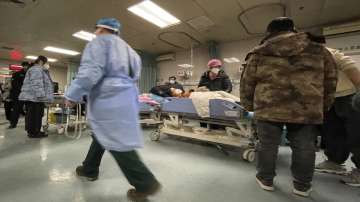Chinese towns hit with deadly Covid wave; patients lie unattended on hospital benches, corridors
Chinese media has claimed that the situation is getting better the ground reports portray a different picture altogether. Even as the young go back to work and lines at fever clinics shrink, many of Hebei’s elderly are falling into critical condition.

China on Saturday continued to grapple with the first-ever national Covid wave with overcrowded emergency wards in small towns southwest of Beijing. In some places, Intensive Care Units (ICUs) were seen turning away ambulances while the lack of beds led to patients being left unattended on benches and corridors of hospitals.
In the span of two days, Associated Press journalists visited five hospitals and two crematoriums in towns and small cities in Baoding and Langfang prefectures, in central Hebei province. The Hebei province which was the epicenter of one of China’s first outbreaks after the state loosened Covid controls in November and December is the worst affected region in the current wave. Now for weeks, the region has been quiet, as people fell ill and stayed home.
Although, Chinese media has claimed that the situation is getting better the ground reports portray a different picture altogether. The government has claimed the area is 'starting to resume normal life.' But it is to be noted that life in central Hebei’s emergency wards and crematoriums is anything but normal. Even as the young go back to work and lines at fever clinics shrink, many of Hebei’s elderly are falling into critical condition. As they overrun ICUs and funeral homes, it could be a harbinger of what’s to come for the rest of China.
People recall horror of Covid
Yao Ruyan paced elderly mother-in-law had fallen ill a week ago with the coronavirus. They went first to a local hospital, where lung scans showed signs of pneumonia. But the hospital couldn’t handle Covid cases, Yao was told. She was told to go to larger hospitals in adjacent counties. As Yao and her husband drove from hospital to hospital, they found all the wards were full. Zhuozhou Hospital, an hour’s drive from Yao’s hometown, was the latest disappointment. “I’m furious,” Yao said, tearing up, as she clutched the lung scans from the local hospital. “I don’t have much hope. We’ve been out for a long time and I’m terrified because she’s having difficulty breathing.”
At Baoding No. 2 Hospital in Zhuozhou on Wednesday, patients thronged the hallway of the emergency ward. The sick were breathing with the help of respirators. One woman wailed after doctors told her that a loved one had died. The ICU was so crowded, ambulances were turned away. A medical worker shouted at relatives wheeling in a patient from an arriving ambulance. “There’s no oxygen or electricity in this corridor!” the worker exclaimed. “If you can’t even give him oxygen, how can you save him?” She said, “If you don’t want any delays, turn around and get out quickly!”. The relatives left, hoisting the patient back into the ambulance. It took off, lights flashing.
ALSO READ | COVID-19 update: India reports 201 new cases in last 24 hours, active tally rises to 3,397
“There’s been so many people dying,” said Zhao Yongsheng, a worker at a funeral goods shop near a local hospital. “They work day and night, but they can’t burn them all.” At a crematorium in Gaobeidian, about 20 kilometers (12 miles) south of Zhuozhou, the body of one 82-year-old woman was brought from Beijing, a two-hour drive, because funeral homes in China’s capital were packed, according to the woman’s grandson, Liang.
“They said we’d have to wait for 10 days,” Liang said, giving only his surname because of the sensitivity of the situation. Liang’s grandmother had been unvaccinated, Liang added, when she came down with coronavirus symptoms, and had spent her final days hooked to a respirator in a Beijing ICU.
Thirty kilometers (19 miles) south in the town of Baigou, emergency ward doctor Sun Yana was candid, even as local officials listened in. “There are more people with fevers, the number of patients has indeed increased,” Sun said. She hesitated, then added, “I can’t say whether I’ve become even busier or not. Our emergency department has always been busy.”
What is the govt's take on the Covid situation in China?
The Chinese government has reported only seven Covid deaths since restrictions were loosened dramatically on December 7, bringing the country’s total toll to 5,241. On Tuesday, a Chinese health official said that China only counts deaths from pneumonia or respiratory failure in its official Covid death toll, a narrow definition that excludes many deaths that would be attributed to Covid in other places.
Meanwhile, experts have forecast between a million and 2 million deaths in China next year, and the World Health Organization warned that Beijing’s way of counting would “underestimate the true death toll.”
(With inputs from AP)
ALSO READ | COVID-19: 'RT-PCR test mandatory for international passengers from China', says Mansukh Mandaviya
ALSO READ | COVID-19 China update: Difficult months ahead as 'coronavirus' cases spiral | KNOW WHY